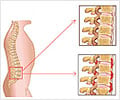Recall of rofecoxib (Vioxx®) from the market in 2004 has led to an increase in falls and fractures among senior citizens, a recent research has revealed.

Researchers recently studied whether the increase of narcotic pain killer use among senior citizens also meant an increase in falls and fractures. They pulled the medical records of over 10,000 people - who were over the age of 65 and had been diagnosed with osteoarthritis -and reviewed their records from 2001 through 2009. They noted if and when a patient had a fall or fracture as well as whether each patient fell into one of three categories of pain management: use of narcotic analgesics with the use of other, non-narcotic analgesics (such as nonsteroidal anti-inflammatory drugs); use of Cox-2 inhibitors alone or with other non-narcotic analgesics; and use of NSAIDs, other or no use of pain medication.
First, the researchers looked at the use of narcotic pain killers. Between 2001 and 2004, use jumped from eight percent to 20 percent, and it doubled to 40 percent by 2009. The use of Cox-2 inhibitors was low among these patients throughout the entire study period (eight percent). Next the researchers looked at falls and fractures and noted that less than one percent of these patients had a fall or fracture in 2001 but this increased four-fold (to 4%) by 2009, and this increase in falls and fractures was strongly associated with the increased use of narcotic pain killers.
"Overall there was a marked increase in the percentage of elderly patients who suffered a fall or fracture, and this increase paralleled the increased percentage of patients given narcotic pain relievers over this time period," explains Bruce N. Cronstein, MD; senior investigator in the study and Paul R. Esserman Professor of Medicine; director, NYU-HHC Clinical and Translational Science Institute; associate director for research, Department of Medicine; director, Division of Translational Medicine, New York University School of Medicine.
The research team also noted that, those who fell (regardless of what type of pain management they received) were older (in their 70s and 80s) and tended to be sicker than the individuals who did not suffer a fall or fracture. These findings made the researchers take a closer look at the effect of age and co-existing diseases and conditions on the risk for falls or fractures by comparing patients who fell to those who did not but who had similar health status and age.
"It is well known that as the elderly develop more chronic illnesses they become more frail and are more likely to fall and break a bone. We wanted to determine whether the risk of falls was associated with the use of narcotic pain relievers or whether physicians simply used narcotic pain relievers in older and sicker patients with chronic osteoarthritis," says Dr. Cronstein.
Advertisement
Source-Newswise









